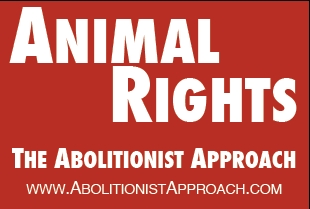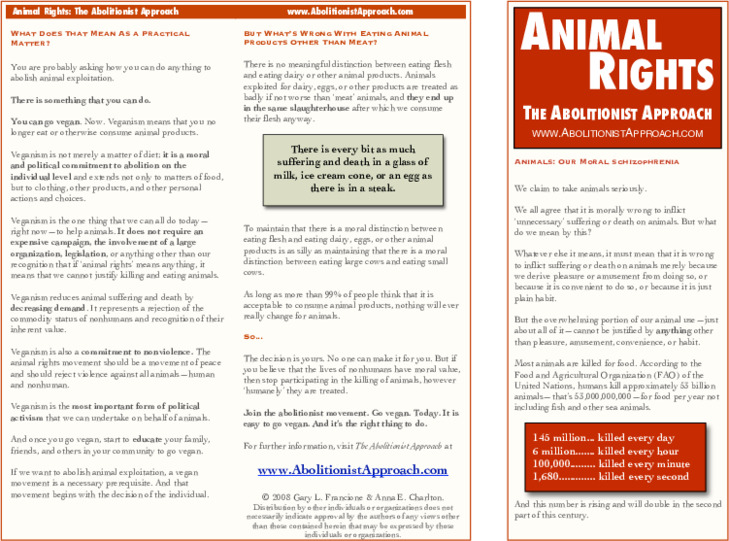
Animal Rights: The Abolitionist Approach
Animals: Our Moral Schizophrenia
We claim to take animals seriously.
We all agree that it is morally "wrong to inflict 'unnecessary' suffering or death on animals. But what do we mean by this?
Whatever else it means, it must mean that it is wrong to inflict suffering or death on animals merely because we derive pleasure or amusement from doing so, or because it is convenient to do so, or because it is just plain habit.
But the overwhelming portion of our animal use - just about all of it - cannot be justified by anything other than pleasure, amusement, convenience, or habit.
Most animals are killed for food. According to the Food and Agricultural Organiz ation (FAO) of the United Nations, humans kill approximately 53 billion animals - that's 53,000,000,000 - for food per year - not including fish and other sea animals.
145 million | killed every day |
And this number is rising and will double in the second part of this century.
How can we justify this slaughter?
We cannot justify it on the ground that we need to eat animal products for reasons of health. We clearly do not need to do so. In fact, the evidence increasingly shows that animal products are detrimental to human health.
We cannot justify it on the ground that it is 'natural'.
because humans have been eating animals for thousands of years. The fact that we have been doing something for a long time does not make it morally right. Humans have been racist and sexist for centuries and we now recognize that racism and sexism are morally wrong.
We cannot justify it as necessary for the global ecology. There is a growing consensus that animal agriculture is an environmental disaster.
|
Because animals consume much more protein than they produce, grains that should be consumed by humans are consumed by animals instead. Thus, along with other factors, animal agriculture condemns many human beings to starvation.
The only justification we have for inflicting suffering and death on 53 billion animals per year is that we get pleasure from eating them; that it is convenient for us to eat them; that it is a habit.
r words, we have no good justification at all.
Our thinking about nonhuman animals is very confused. Many of us live, or have lived, with companion animals, such as dogs, cats, rabbits, etc. We love these animals. They are important members of our families. We grieve when they die.
But we stick forks into other animals no different from the ones we love. That makes no sense.
Our Treatment of Animals
We not only use animals for all sorts of purposes that cannot be considered as 'necessary,' but we treat them in ways that would be considered as torture if humans were involved.
There are animal welfare laws that require us to treat animals 'humanely,' but these laws are largely meaningless because animals are property; they are economic commodities that have no value other than what we accord them. As far as the law is concerned, nonhuman animals are no different from cars, furniture, or any other property that we own.
Because animals are property, we generally allow people to use animals for whatever purpose they want and to inflict horrible suffering on them in the process.
Why Not Get Better Laws and Industry Standards?
Most animal protection organizations in the United States and Europe maintain that the solution to the problem of animal exploitation is to improve animal welfare laws or to pressure industry to improve standards of treatment. These organizations campaign for more 'humane' methods of slaughter, more 'humane' systems of confinement, such as larger cages, etc. Some of these organizations maintain that by improving treatment, animal use will one day be ended altogether or will at least be reduced significantly.
But is this the solution? No, it is not.
The economic realities are such that welfare reforms provide little, if any, improvements. A 'cage-free' egg involves as much suffering as a conventional egg.
The characterization of animal exploitation as becoming more 'humane' encourages the public to become more comfortable about animal use and this encourages continued consumption of animal products and may even increase net suffering and death. |
Moreover, there is absolutely no proof whatsoever that animal welfare reforms will lead to the end of animal use or significantly reduced animal use. We have had animal welfare standards and laws for more than 200 years now and we are exploiting more animals in more horrible ways than at any time in human history.
And, most important, reforming exploitation ignores the fundamental question: how can we justify using animals at all as our resources - however 'humanely' we treat them?
What Is the Solution?
The solution is to abolish the exploitation of animals, not to regulate it. The solution is to recognize that just as we recognize that every human, irrespective of her particular characteristics, has the fundamental right not to be treated as the property of another, we must recognize that every sentient (perceptually aware) nonhuman has that right as well.
What Does That Mean As a Practical Matter?
You are probably asking how you can do anything to abolish animal exploitation.
There is something that you can do.
You can go vegan. Now. Veganism means that you no longer eat or otherwise consume animal products.
Veganism is not merely a matter of diet; it is a moral and political commitment to abolition on the individual level and extends not only to matters of food, but to clothing, other products, and other personal actions and choices.
Veganism is the one thing that we can all do today - right now - to help animals. It does not require an expensive campaign, the involvement of a large organization, legislation, or anything other than our recognition that if 'animal rights' means anything, it means that we cannot justify killing and eating animals.
Veganism reduces animal suffering and death by decreasing demand. It represents a rejection of the commodity status of nonhumans and recognition of their inherent value.
Veganism is also a commitment to nonviolence. The animal rights movement should be a movement of peace and should reject violence against all animals - human and nonhuman.
Veganism is the most important form of political activism that we can undertake on behalf of animals.
And once you go vegan, start to educate your family, friends, and others in your community to go vegan.
If we want to abolish animal exploitation, a vegan movement is a necessary prerequisite. And that movement begins with the decision of the individual.
What Does That Mean As a Practical Matter?
You are probably asking how you can do anything to abolish animal exploitation.
There is something that you can do.
You can go vegan. Now. Veganism means that you no longer eat or otherwise consume animal products.
Veganism is not merely a matter of diet; it is a moral and political commitment to abolition on the individual level and extends not only to matters of food, but to clothing, other products, and other personal actions and choices.
Veganism is the one thing that we can all do today - right now - to help animals. It does not require an expensive campaign, the involvement of a large organization, legislation, or anything other than our recognition that if 'animal rights' means anything, it means that we cannot justify killing and eating animals.
Veganism reduces animal suffering and death by decreasing demand. It represents a rejection of the commodity status of nonhumans and recognition of their inherent value.
Veganism is also a commitment to nonviolence. The animal rights movement should be a movement of peace and should reject violence against all animals - human and nonhuman.
Veganism is the most important form of political activism that we can undertake on behalf of animals.
And once you go vegan, start to educate your family, friends, and others in your community to go vegan.
If we want to abolish animal exploitation, a vegan movement is a necessary prerequisite. And that movement begins with the decision of the individual.
But What's Wrong With Eating Animal Products Other Than Meat?
There is no meaningful distinction between eating flesh and eating dairy or other animal products. Animals exploited for dairy, eggs, or other products are treated as badly if not worse than 'meat' animals, and they end up in the same slaughterhouse after which we consume their flesh anyway.
| There is every bit as much suffering and death in a glass of milk, ice cream cone, or an egg as there is in a steak. |
To maintain that there is a moral distinction between eating flesh and eating dairy, eggs, or other animal products is as silly as maintaining that there is a moral distinction between eating large cows and eating small cows.
As long as more than 99% of people think that it is acceptable to consume animal products, nothing will ever really change for animals.
So...
The decision is yours. No one can make it for you. But if you believe that the lives of nonhumans have moral value, then stop participating in the killing of animals, however 'humanely' they are treated.
Join the abolitionist movement. Go vegan. Today. It is easy to go vegan. And it's the right thing to do.
- For further information, visit The Abolitionist Approach
- The pamphlet as pdf
 Anna E. Charlton
Anna E. Charlton
 Prof. Gary L. Francione
Prof. Gary L. Francione
